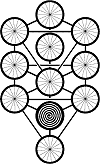|
Introduction
As I've written about elsewhere, post-Temple Judaism reinvented the idea of "Torah" so that the ideal of the sage replaced the function of the priest. But the Oral Law itself lends itself to interpretations that extend farther and farther from the plain sense of Scripture (consider the aggadic literature of the Talmud, for example), and therefore mystical speculation may be regarded as its logical end. Indeed, according to Kabbalistic tradition, a third (or "hidden") Torah was given to Moses at the same time as the written Torah. The guru of Kabbalah, therefore, is the highest pitch of the "sage ideal" in modern Judaism.
Kabbalistic interpretations really constitute the "final frontier" of an imaginative Judaism that has displaced the authority of the Scriptures. Once the idea of an Oral Torah was admitted and accepted as authoritative (after the destruction of the Temple), it became increasingly difficult to prevent an ever-increasing regress of meaning away from the plain sense of the texts. After all, the Talmud includes stories, legends, and fabulous dialogs based on oral tradition of the sages. These are usually qualified as being non-authoritative aggadah as opposed to authoritative halacha, but the line of demarcation in these matters is not so clear. And once imaginative interpretation, midrash, and so on, are given their place, what's to stop the claim of a "third" Torah -- or a fourth, fifth, and six, for that matter? Hence we see the dictum, Shiv'im Panim laTorah: "The Torah has 70 faces." But why stop at seventy, other than the fact that it's a nice number? Why not seventy times seven? Why, indeed, not go on to say "to each his own meaning" and simply allow for an infinite number of "faces" to the Torah?
For the Kabbalist, the pshat (plain sense) of Scripture is simply the starting point for attaining metaphorical and esoteric truth. For example, when God said to Abraham, Lekh Lekha ("Go forth...to the land I will show you"), the Zohar reads, "Go to yourself, that is, search deep within yourself to discover the divine." Similarly, the story of the Exodus from Egypt is "really" the psychological journey of every man. "Pharaoh" represents the false pride of the ego, the "Egyptians" represent the mesmerizing comforts of the crowd, our "slavery" represents our bad habits and routines, and "Moses" represents our "higher self" being called by God to live as a free person.... Ultimately, the various stories of the Bible represent God's inner life and attributes. Biblical personalities and events therefore represent sefirot (divine self-disclosures or "energies"). Indeed, all of Scripture is thought to be one "long name" of God being sounded.... There is a distinction between "appearance" and "reality," and words of the Scriptures are signs or indicators of this deeper reality... Hence the story of Adam and Eve is about our loss of God-conscousness, and the remedy is to regain that consciousness by means of Kabbalistic awareness....
In some ways legalism and mysticism are different sides of the same coin. What do I mean? Well, the legalist regards correctness of behavior, especially when it comes to religious ritual behavior, as the all-important factor. "Do not handle, Do not taste, Do not touch" (Col. 2:21). The quintessential example of this lifestyle is found in the observant ultra-Orthodox Jew: every moment of every day is intricately constrained by innumerable religious rituals and obligations. The legalistic lifestyle is therefore highly technical and requires an enormous amount of specialized study and training (in this regard, it's not unlike the sequence of a Japanese tea ceremony that involves hundreds of carefully prepared steps). "Salvation," for the legalist, is a matter personal merit, and a theological system built on such a legalistic framework is essentially a meritocracy. Do a mitzvah, receive a merit; omit a mitzvah, lose a merit. In the end, after making our appeals for forgiveness on Yom Kippur, God will judge our lives to see if we have more merits than demerits, and if the verdict is good (i.e., the balance of the scale tips to our favor), then we will enjoy another year of life -- and hopefully (after we die) bliss in the world to come....
The mystic, on the other hand, focuses more on the idea of secret knowledge (gnosis) or a special experience as the way to know God. For the mystic, the special apprehension (or experience) of insight is what yields "salvation," which is usually defined in terms of an altered state of consciousness. We are "saved" when we regain our lost God-consciouness and identify ourselves with the totality of Being. (In that regard, salvation is not really necessary, since we are "saved" already -- even if we don't realize it yet.) When we forsake all our ego distinctions we are "absorbed" into a Nirvana-like divine state of being -- a foretaste of bliss in the world to come.
Despite claims from its practitioners that Kabbalah is ultimately rooted in the study of the Jewish Scriptures, it's evident that much of its doctrine derives from pagan sources such as Zorastrianism, the Neoplatonism of Philo, Gnosticism, medieval alchemy, Hegelian philosophy, and other sources. In that regard, Kabbalah may be regarded as the ultimate attempt to synthesize Judaism with pagan culture. The result has yielded a Gnostic and "panentheistic" (God-is-in-everything yet-is-above-everything) system that regards each soul as a "window" or "monad" of the Divine life.
Go to any major book store these days and take a look through the Judaism section. There you're likely to see any number of books, tapes, and DVDs offering to guide you into the "mystical side" of Jewish spirituality (called Kabbalah).
Kabbalah is apparently the hot religious topic these days, and the trend doesn't look like it will abate any time soon. Various Hollywood stars now advocate its teachings (for example, Madonna, the popular diva, is said to be "as famous in Israel for her devotion to the Kabbalah as for her voice"). Moreover, the fastest growing movement in Judaism (Chabad) actively promotes Kabbalistic philosophy throughout the world. Alarmingly, even some "Messianic" teaching ministries are now recommending the study of the Zohar as part of the "Jewish Roots" of the Christian faith!

Perhaps part of the reason for the explosive popularity of Kabbalah has to do with the stress and anxiety of our age. Like the ancient Epicureans who sought tranquility and freedom from fear through philosophical speculation (ataraxia), many people today are looking for a way to cope with their unhappiness, angst, and inner pain.... Kabbalah offers a way to escape from seemingly pointless suffering by claiming that we all can reconnect with "God, the universe, and everything." And the "good news" is that we can all get there by simply "remembering" our inner divinity and understanding ourselves as parts of God.
Please understand that I consider the rise of popular Kabbalah to be a potential source of danger to Christians, especially for those who are beginning to discover the Jewish roots of their faith. As the mystical tradition of a different faith system (i.e., Judaism), it should be remembered that Kabbalah represents a self-actualization process that implies that the blood atonement of the Messiah is unnecessary. For the Kabbalist, the correct apprehension of insight is what yields "salvation," usually defined in terms of an altered state of awareness. We are "healed" when we regain our lost God-consciouness (i.e., our inner divinity) and re-identify ourselves with the totality of Being. In most versions of Kabbalah, there is no need for the sacrifice of Yeshua, no need to be delivered from the penalty of guilt and sin, no honest reading of the plain sense of the Scriptures.... We don't need the Gospel -- we need gnosis; we don't need spiritual re-creation, we need release from the ego. Only when we forsake our ego distinctions can we experience a foretaste of bliss in the world to come. It should be obvious that these ideas contradict the most basic teachings of both the Torah and the New Testament...
Nevertheless I do not wish to be unfair to some of the real insights Kabbalah can provide. In fact, it should be noted that theoretical (as opposed to popular) Kabbalistic is not unlike some Christian theological systems that attempt to explain the origin, purpose, and goal of creation. For example, Christian theologians refer to a "secret agreement" made within the Godhead before the creation of the world that God the Father would send His Son to become the suffering Redeemer of an alienated humanity, and the Holy Spirit (Shekhinah) would be the agent of restoration in the fallen world... Within the very nature of the Godhead, in other words, there is the idea of creation, redeeming "fallen" humanity, and restoring all things back to final unity, when God will ultimately be "all-in-all"... In this regard, Kabbalah is not unlike other forms of philosophical theology that attempt to provide an overarching narrative to the universe and its purpose. The reason Kabbalah might seem "strange" to us is because we are not in the habit of asking the questions it directly addresses (for more information, please see the Kabbalah pages on this site.)
We need to be careful to use discernment that comes from the Holy Spirit to "test the spirits" (1 John 4:1) -- and that includes testing the doctrine of teachers who are part of "Messianic" ministries... Satan can disguise himself as an "angel of light" (2 Cor. 11:4). God has chosen not to reveal all of His secrets to us in the pages of Scripture, and there is therefore much that will remain a mystery. "The secret things belong unto the LORD our God; but the things that are revealed belong unto us and to our children for ever" (Deut. 29:29). Meanwhile, if we ask the Light of the world (ūÉūĢų╣ū© ūöųĖūóūĢų╣ū£ųĖūØ) - Yeshua our LORD - to give us the wisdom, understanding, and knowledge that we need to truly love and serve God, He will surely answer our prayer.... Shalom.
|


